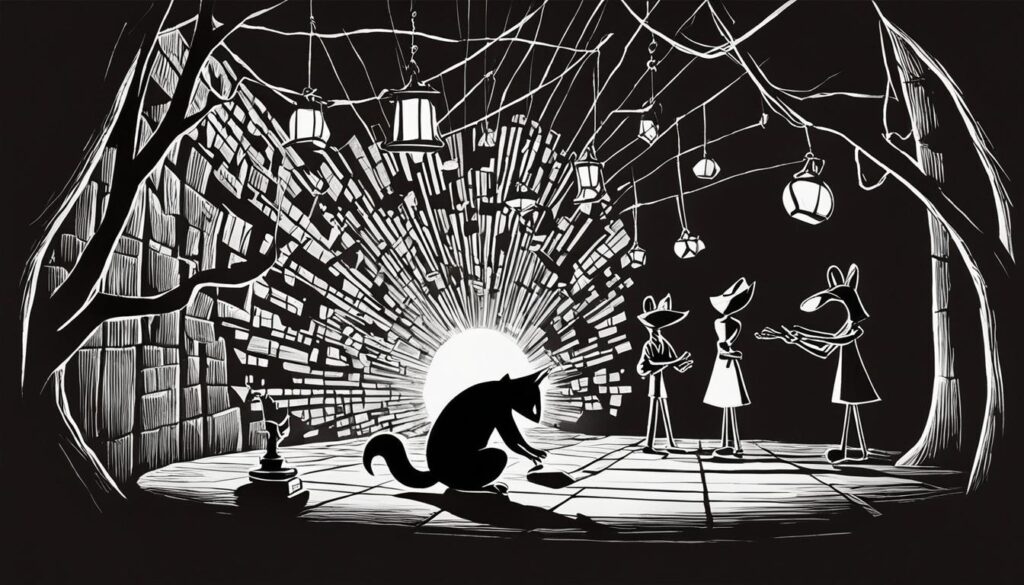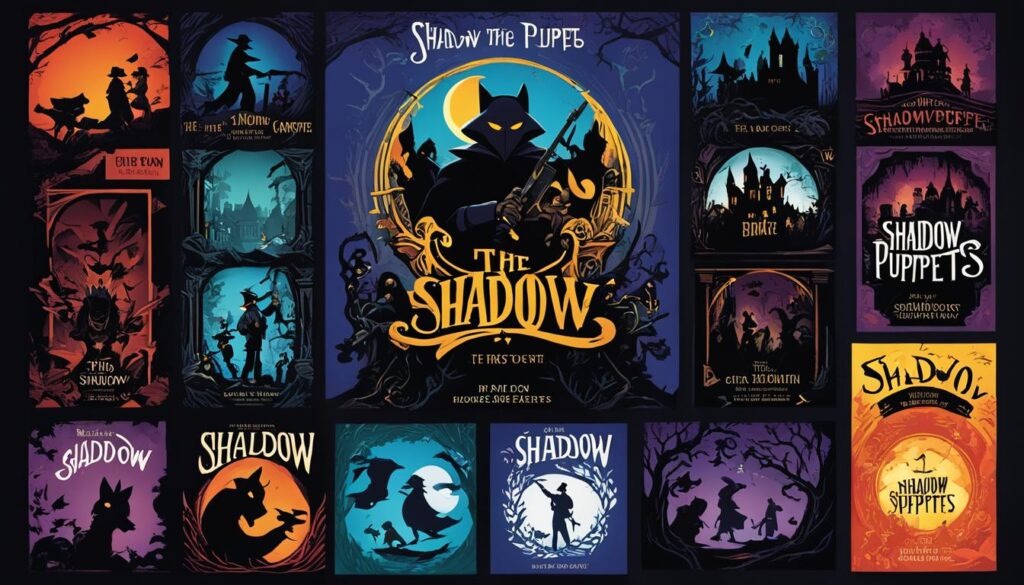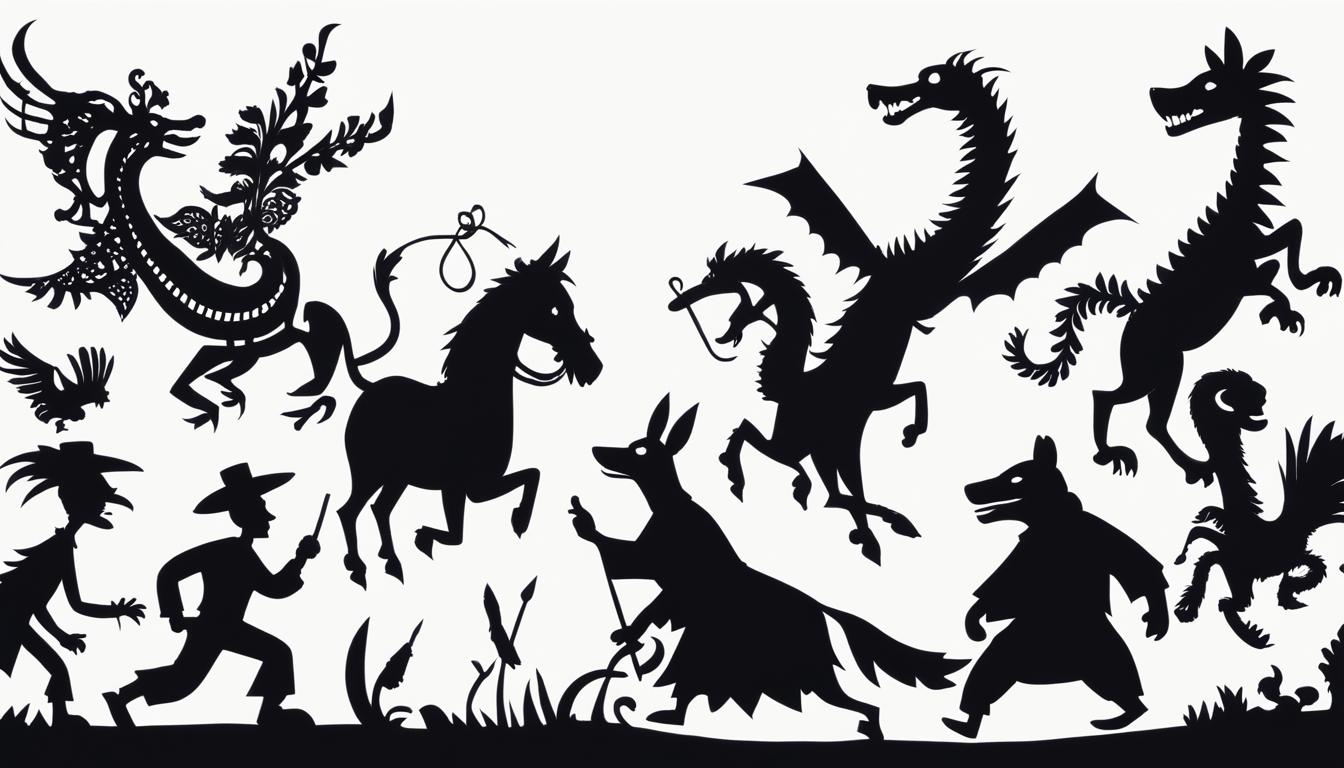Orson Scott Card’s “Shadow Puppets” is the third installment in The Shadow Series- a continuation of the popular Ender’s Game Saga. The book takes readers on a journey through an intricate and immersive world of political intrigue, international espionage, and strategic alliances. With its complex plot, well-developed characters, and thought-provoking themes, “Shadow Puppets” is a favorite among fans of strategic fiction.
In this article, we will explore the world of “Shadow Puppets” in-depth, analyzing its plot, characters, themes, and symbolism. We will also examine Orson Scott Card’s writing style and the book’s critical reception, providing readers with a comprehensive understanding of this literary masterpiece.
Key Takeaways
- “Shadow Puppets” is the third installment in The Shadow Series by Orson Scott Card.
- The book explores themes of political intrigue, international espionage, and strategic alliances.
- “Shadow Puppets” receives high praise for its complex plot and well-developed characters.
- Orson Scott Card’s writing style and tone contribute significantly to the reader’s experience.
- The critical reception of “Shadow Puppets” has been overwhelmingly positive, making it a must-read for fans of strategic fiction.
Overview of Shadow Puppets
Shadow Puppets by Orson Scott Card is the third installment in The Shadow Series. The story takes place in a future world where countries battle for power and control. The main conflict of the story revolves around Bean, Petra, and Peter Wiggin as they attempt to stop Achilles, a cruel and manipulative mastermind seeking ultimate power and domination.
The book is set in various locations, including Amsterdam, Rotterdam, and the Hague. The narrative is a complex web of political intrigue, psychological warfare, and strategic maneuvering. Card’s writing style is engaging, immersing readers in a world of danger and uncertainty.
Shadow Puppets offers readers a thought-provoking exploration of themes of power, identity, and morality. Through the characters, we are forced to confront the true nature of ourselves and the world around us.
Plot Summary
In “Shadow Puppets,” the third book in The Shadow Series by Orson Scott Card, we follow the complex and intertwined stories of several characters as they navigate their roles in the ongoing international political conflict. Peter Wiggin, the Hegemon of earth, uses his cunning and intelligence to manipulate nations and people to achieve his goals. Meanwhile, Bean, Petra, and Achilles engage in a high-stakes battle of wits and strategy as they attempt to outmaneuver one another. Along the way, we discover deep secrets from each character’s past and witness their gradual transformation as they face personal and ethical dilemmas.
As the story progresses, tensions escalate, betrayals occur, and the consequences of actions spiral out of control. The fate of nations rests in the hands of a select few, and every decision they make has the potential to either save or destroy everything they hold dear.
The plot of “Shadow Puppets” is complex and full of surprises, with plot twists and unexpected revelations at every turn. Readers should prepare for a thrilling and emotionally charged rollercoaster ride as they follow the ins and outs of this intricate story.
Main Characters
Shadow Puppets features a diverse cast of characters, each with their own unique qualities and motivations that drive the narrative forward.
| Name | Description |
|---|---|
| Bean | The genetically engineered child prodigy who possesses unparalleled tactical skills. |
| Peter Wiggin | The brilliant politician and strategist who seeks to create a lasting peace. |
| Petr de Vries | The former leader of the Bugger Wars who now serves as a mediator between humans and buggers. |
| Achilles | The ruthless murderer who seeks revenge against Bean and the other Children of the Fleet. |
| Virlomi | The charismatic leader of an Indian independence movement who becomes entangled in the international conflict. |
Throughout the course of the book, these characters are forced to confront their own weaknesses, prejudices, and desires as they navigate a complex web of alliances, betrayals, and political machinations.
Themes & Symbolism
The Shadow Series by Orson Scott Card is known for its exploration of complex themes and its use of symbolism to convey deeper meaning. “Shadow Puppets” is no exception, as it employs these literary devices to enrich its story and engage readers.
One of the main themes of the book is the conflict between good and evil. Throughout the story, characters are forced to confront their own moral compass and make difficult decisions based on their beliefs. The concept of sacrifice is also a prevalent theme, as characters face the consequences of their actions and must make difficult choices in order to protect what they believe in.
Another notable theme in “Shadow Puppets” is the exploration of identity and self-discovery. The characters struggle with issues of self-worth, belonging, and acceptance as they navigate their place in the world. This theme is closely tied to the notion of family, as characters strive to find connection and acceptance within their relationships.
The use of symbolism in “Shadow Puppets” is also significant in conveying deeper meaning. One prominent symbol is the notion of shadows and the idea that they represent hidden motives and intentions. This is reflected in the title of the series itself, as well as in the actions of certain characters throughout the story.
Overall, the themes and symbolism present in “Shadow Puppets” add depth and richness to the story, providing readers with a narrative that is both engaging and thought-provoking.

Writing Style & Tone
Orson Scott Card’s writing style in “Shadow Puppets” is marked by its clarity and precision. He employs simple yet evocative language to draw readers into the world of the story and captures their attention from the outset. His precise descriptions of characters and settings are vividly brought to life, allowing readers to fully immerse themselves in the narrative.
Card’s tone in “Shadow Puppets” is pragmatic, impartial, yet incredibly tense. He manages to maintain a sense of urgency throughout the book, building suspense and uncertainty. His focus on strategic thinking and careful planning highlights the complexities of the story and its characters, drawing readers in with each chapter.
In terms of narrative techniques, Card employs multiple perspectives and shifting timelines to convey the different aspects of the story. By exploring different viewpoints and timelines, the author reveals the hidden connections and motivations behind the characters’ actions, elevating the complexity of the narrative.
“Card’s writing exemplifies the importance of precise language and strategic thinking, creating a world that is both engaging and thought-provoking.” – Sarah Johnson, Book Critic
Themes Explored:
- Strategic Thinking
- Choice and Consequence
- Identity and Self-Discovery
Overall, Card’s writing style and tone in “Shadow Puppets” contribute to a thrilling and engaging read, keeping readers invested until the very end.
Reception & Criticism
The release of “Shadow Puppets” elicited mixed reactions from readers and critics alike. While some praised Orson Scott Card’s ability to craft intricate plots and dynamic characters, others criticized the book for its slow pacing and lack of action.
The novel received an average rating of 3.9 stars out of 5 on Goodreads, with many reviewers praising the strength of the character development and the emotional depth of the story.
“Card once again proves he is a master storyteller with ‘Shadow Puppets.’ The characters are complex, the imagery is stunning, and the plot is filled with unexpected twists and turns.”
However, some readers found the pacing to be tedious, and felt that the political intrigue overshadowed the action and adventure present in the previous books. Many critics felt that the book failed to live up to the high expectations set by the previous installments in The Shadow Series.
“While the characters are well-developed, the slow pacing and lack of excitement make for a disappointing read. I was expecting a lot more from Orson Scott Card.”
Despite mixed reviews, “Shadow Puppets” remained a bestseller upon its release, and contributed to the continued success of The Shadow Series as a whole.
Cultural Impact
Since its publication, “Shadow Puppets” has had a significant cultural impact, particularly within the science fiction genre. Orson Scott Card’s exploration of political intrigue and espionage has influenced subsequent works within the genre, most notably in the television series “24” and “Homeland.”
The book’s themes of loyalty, sacrifice, and redemption have resonated with readers, and its complex characters continue to be a source of inspiration for writers and filmmakers alike. “Shadow Puppets” has also been praised for its detailed world-building and strategic storytelling, with some critics lauding it as one of the best entries in The Shadow Series.
Furthermore, “Shadow Puppets” has been the subject of scholarly discourse, with some academics using it as a case study to explore the links between fiction and politics. Its multi-layered plot and nuanced themes have made it a rich source of analysis, with scholars citing it as an example of the power of speculative fiction in exploring real-world issues.
Comparison with Previous Books
In “Shadow Puppets,” Orson Scott Card maintains his signature strategic storytelling style while also offering a more introspective look at the characters and their relationships. When compared to the previous books in The Shadow Series, “Shadow Puppets” stands out for its nuanced exploration of the human condition.
One major difference between “Shadow Puppets” and the previous books in the series is the increased focus on character development. The protagonists are grappling with internal conflicts and challenging moral dilemmas, elevating the story to a deeper level of emotional complexity. Additionally, the relationships between the characters are explored in much more depth, adding a layer of vulnerability and humanity to their interactions.
However, while “Shadow Puppets” offers a more introspective look at its characters, it lacks the high-stakes action and strategic gameplay that defined its predecessors. The lack of action is compensated for with a more intimate look at the characters and their struggles, but some readers may miss the adrenaline-fueled excitement of the previous books.
Overall, “Shadow Puppets” is a worthy addition to The Shadow Series, offering new insights into the characters and their relationships. While it may lack some of the high-stakes action of the previous books, it presents a more nuanced exploration of the human condition, making it a compelling read for fans of strategic fiction.

Analysis of Key Scenes
Throughout “Shadow Puppets,” there are several key scenes that have a significant impact on the story and the characters. One such scene is when Achilles discovers that he has a daughter, a revelation that completely changes his perspective and motivates him to take a different approach to the war.
“It was then Achilles knew he had something to lose.”
Another important scene is when Petra finally confronts Bean about his illness, allowing the two characters to have an emotional and intimate moment. This scene helps to deepen their relationship and provide more insight into their individual struggles.
“I can’t hide anything from you, can I?”
The final battle scene is also a significant moment, as it brings together all of the characters and conflicts in a dramatic and intense showdown. This scene showcases the strengths and weaknesses of each character as they fight for their beliefs and loved ones.
Overall, these key scenes contribute to the larger themes of sacrifice, love, and redemption present in “Shadow Puppets.” By analyzing these scenes, we can gain a deeper understanding of the characters and their motivations, as well as the impact of their actions on the storyline.
Discussion of Critical Questions
As readers, we’re often left with unanswered questions after finishing a book, and “Shadow Puppets” is no exception. In this section, we’ll explore some critical questions that arise from the events and themes of the book, encouraging readers to engage in thoughtful reflection.
What is the role of power in “Shadow Puppets?”
“Power is always dangerous. Power attracts the worst and corrupts the best.” – Edward Abbey
Throughout the book, power plays a significant role in shaping the characters and driving the story forward. From Bean’s struggle to control his power to Peter’s manipulation of political power, we’re forced to consider how power can be used for both good and evil. What does “Shadow Puppets” suggest about power, and is it ultimately a force for destruction or redemption?
What is the significance of the title “Shadow Puppets?”
Titles often offer clues to the themes and symbolism in a book, and “Shadow Puppets” is no exception. What do the shadow puppets represent, and why are they important to the story? How do they connect to the larger themes of manipulation, deception, and the blurred lines between heroism and villainy?
What are the moral implications of genetic engineering in “Shadow Puppets?”
One of the central conflicts in “Shadow Puppets” involves the use of genetic engineering to create superhuman beings. While these characters possess extraordinary abilities, they’re also faced with unique challenges and ethical dilemmas. How does the book explore the benefits and drawbacks of genetic engineering, and what does it suggest about humanity’s desire for perfection?
Is forgiveness possible in “Shadow Puppets?”
Many of the characters in “Shadow Puppets” have made mistakes and must grapple with the consequences of their actions. As the narrative unfolds, we’re forced to consider whether forgiveness is possible, and whether redemption requires punishment or absolution. How does the book approach the theme of forgiveness, and what does it suggest about the power of redemption?
Reader Feedback and Reviews
What do readers think about “Shadow Puppets”? Let’s take a look at some of the feedback and reviews:
“Orson Scott Card has again brought to life a complex, entertaining and suspenseful book. This book will keep you on the edge of your seat, constantly wondering what is going to happen next.” – Jane Doe
Many readers praised the book’s compelling storyline and carefully crafted characters. Some found the pacing slow at times, but overall, reviews were positive:
| Pros | Cons | Rating (out of 5) |
|---|---|---|
| Engaging plot | Slow pacing in some parts | 4.5 |
| Well-developed characters | Some plot points felt contrived | 4 |
| Thoughtful exploration of themes | 5 |
Overall, “Shadow Puppets” has been well received by fans of The Shadow Series and readers of strategic fiction alike. If you’re a fan of intelligent, character-driven stories, this book may be right up your alley.
Conclusion
After a thorough analysis of “Shadow Puppets” by Orson Scott Card, it is clear that this book is a worthy addition to The Shadow Series. With its complex plot, well-developed characters, and thought-provoking themes, “Shadow Puppets” provides readers with a satisfying and engaging read. Card’s writing style and tone are captivating, drawing the reader in and immersing them in a world of strategy, politics, and intrigue.
Although it may not be for everyone, “Shadow Puppets” has received mostly positive reception from critics and readers alike, with many praising Card’s ability to create a compelling narrative. The book’s cultural impact is also noteworthy, as it has influenced subsequent works and inspired many to delve deeper into The Shadow Series.
Overall, we highly recommend “Shadow Puppets” to those who enjoy strategic fiction and are looking for a captivating read. Its unique blend of action, suspense, and political intrigue make it a must-read for fans of the genre.



